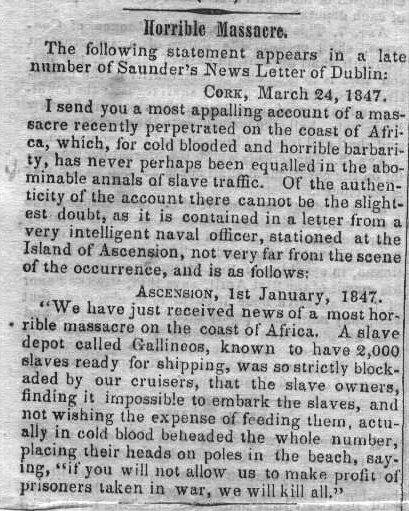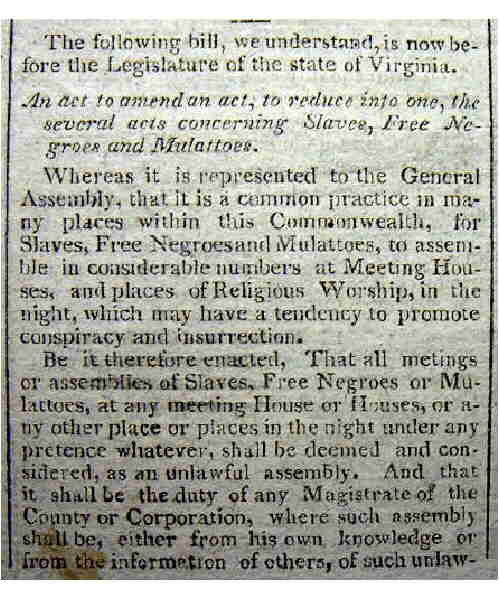THE BLOOD OF THE LAMB
|
HORRIBLE MASSACRE AT GALLINEOS

Horrible Massacre (Washington Republican, Salem Indiana, Friday, May 21, 1847.) & Carrol County (Maryland) Democrat, April 29, 1847
England outlawed slavery by the 1800’s however, Africa was addicted to slaveries wealth and continued the practice until modern times. Many African’s were not ready to let go of the slave trade easily and lower their life style. Although most East Africa slavers were Arab, most West Africa slavers were Black. It should be noted that most African-Americans are of West African descent. An article appeared in an Indiana and Maryland newspaper in 1847 that describes the execution of 2000 slaves. Ascension Island is in the Atlantic Ocean between Africa and South America which suggest that Gallineos is a West African port. Since many Black West African tribes were slavers it is assume these slavers were Black. tribesmen. The article speaks for its self.
NEGRO PRAYER MEETINGS BANNED

New York Herald Saturday, January 28, 1804
An at to amend an act, to reduce into one, the several acts concerning Slaves, Free Negroes and Mulattoes.
Where as it is represented to the General Assembly, that it is a common practice in many places within the Commonwealth, for Slaves, Free Negroes or Mulattoes, to assemble in considerable numbers at Meeting Houses, and places of Religious Worship, in the night, which may have a tendency to promote conspiracy and insurrection.
Be it therefore enacted, That all meetings or assemblies of Slaves, Free Negroes or Mulattoes, at any Meeting Houses, or any other place or places in the night under any pretence whatever, shall be deemed and considered, as an unlawful assembly. And that it shall be the duty of any Magistrate of the County or Corporation, where such assembly shall be, either from his own knowledge or from the information of others, of such unlawful assembly or meeting, to issue his warrant, directed to any sworn officer or officers, authorizing him or them to enter the house or houses where such unlawful meeting are, for the purpose of apprehending or dispersing the Slaves, Free Negroes and Mulattoes, and to inflict corporal punishment on the offender or offenders, at his discretion, not exceeding twenty lashes.
And be it further enacted, That the said officer or officers, shall have power to summon any person to aid and assist in the execution of any warrant or warrants directed to him or them, for the purposes aforesaid, who on refusal, shall be subject to a fine, at the discretion of the magistrate, not exceeding ten dollars. All acts, or parts of acts, coming within the preview of this act, and is hereby repealed.
This act shall be in force, from and after the passing thereof.
[This gentle reader, is emphatically the State of Liberty and equality------the liberty of whipping the blacks for attending religious evening lectures.]
NEW YORK HERALD
SATURDAY, JANUARY 28, 1804
BEATINGS of the innocent
If Negroes were caught in a prayer meeting, the punishment was flogging with a whip such as the “cat-of-nine-tails.” These whippings lacerated their body causing bleeding and scaring. The Blood probably stained their clothing. This narratives describes slaves whipped for praying and note the bleeding caused by the whip. The blood of the innocent probably soaked their clothes.
“ Marse Carter had a house gal by de name uf Frances, an' she had wait on de white folks all day long, an' when night wud come, he made her slip out 'mongst de slaves an' see what dey wuz doin' an' talkin' 'bout.
My mammy wus livin' wid 'nudder man, named Joe, an' one night Joe an' my Mammy an' some more slaves wuz down on deir knees prayin' fur de good Lord to sot dem free, an' Frances wus slippin' round de corner uf de house an' heard what dey wus sayin'. An' she goes back to de house an ' tells de old marse, an ' he sent de oberseer down dar an ' brung ebery one uf dem to de stake, an' tied dem, an' whipped dem so hard dat blood come from some uf dems backs”
July Halfen, Bullwhip Days, p196
"Slavery was the worst days was ever seed in the world. They was things past tellin', but I got the scars on my old body to show to this day. I seed worse than what happened to me. I seed them put the men and women in the stock with they hands screwed down through holes in the board and they feets tied together and they naked behinds to the world. Solomon the [sic] overseer beat them with a big whip and massa look on. The niggers better not stop in the fields when they hear them yellin'. They cut the flesh most to the bones and some they was when they taken them out of stock and put them on the beds, they never got up again...Seems like after I got bigger, I member' more'n more niggers run away. They's most al us cotched. Massa used to hire out his niggers for wage hands. One time he hired me and a nigger boy, Turner, to work for some ornery white trash name of Kidd. One day Turner goes off and don't come back. Old man Kidd say I knowed bout it, and he tied my wrists together and stripped me. He hanged me by the wrists from a limb on a tree and spraddled my legs around the trunk and tied my feet together. Then he beat me. He beat me worser than I ever been beat before and I faints dead away. When I come to I'm in bed. I didn't care so much iffen I died... Massa looks me over good and says I'll git well, but I'm ruint for breedin' chillun."
Mary Reynolds, Bull Whip Days
American slaves frequently called on Jesus in times of trouble and apparently continued the practice long after slavery. Recall that the Lord took the place of ancestors in heaven and was called upon in times of need.
“Lord is Lord of all and richly blesses all who call on him, 13for, "Everyone who calls on the name of the Lord will be saved."[1] Romans 10
Apparently slave masters and overseers were not comfortable with slaves calling on the Lord while they were whipping them so the slave was forbid in this case from “calling on the Lord.”
Dey wouldn't allow 'em to call on de Lord when dey were whippin' 'em, but dey let 'em say, "Oh, pray! Oh, pray, Marster!" Dey would say, "Are you goin' to work? Are you goin' visitin' widout a pass? Are you goin' to run away?" Dese is de things dey would ax him , when dey wuz whippin' him.
Alex Woods, Raleigh, North Carolina, Bull Whip Days, p244
Although they could not always call the Lord's name, the Lord understood and was not easily fooled. Note that in the following narrative, William Moore was from Texas and Alex Woods was from North Carolina. The large separation between them suggest that saying “pray” instead of “Lord” was not an isolated practice during whippings.
“ One day, I am down in the hog pen riling the hogs and teasing them like any yearling boy will do, when I hear a loud agony screaming up to the house. I can't make out who 'tis. I'm curious and I start up to the house and I hear, "Pray Marse Tom. Pray, Marse Tom. " But still I can't tell who 'tis. When I get up close I see Marse Tom got my mammy tied to a tree with hir clothes pulled down and he is laying it on her with a bullwhip and de blood is running down her eyes and off her back.
I goes crazy. I say, "Stop, Marse Tom, " and he swings the whip and it don't reach me good, but it cuts just the same. I sees Miss Mary standing in the cook house door. I run aryund crazy like, and I see a big rock and I take it and I throw it and it ketches Marse Tom in the skull and he goes down like a poled ox.”
William Moore, Selma Alabama/Limestone County Texas, Bull Whip Days pg 332

John Gabriel Stedman, Narrative Of A Five Year Expedition Against The Revolted Negroes Of Surinam In Guiana On The Wild Coast Of South America From The Years 1772 To 1777 (London, 1796), vol. 1, facing p. 326.)
I have for some time been happily silent upon the subject of cruelty; and sorry I am, at a time when all appeared harmonious and peaceable, to be under the necessity of relating some instances, which I am confident must inspire the most unfeeling reader with horror and resentment. The first object which attracted my compassion during a visit to a neighbouring estate, was a beautiful Samboe girl of about eighteen, tied up by both arms to a tree, as naked as she came into the world, and lacerated in such a shocking manner by the whips of two negro-drivers, that she was from her neck to her ancles literally dyed with blood. It was after she had received two hundred lashes that I perceived her, with her head hanging downwards, a most affecting spectacle. When, turning to the overseer, I implored that she might be immediately unbound, since she had undergone the whole of so severe a punishment; but the short answer which I obtained was, that to prevent all strangers from interfering with his government, he had made an unalterable rule, in that case, always to double the punishment, which he instantaneously began to put in execution: I endeavoured to stop him, but in vain, he declaring the delay should not alter his determination, but make him take vengeance with double interest. Thus I had no other remedy but to run to my boat, and leave the detestable monster, like a beast 9f prey, to enjoy his bloody feast, till he was glutted. From that day I determined to break off all communication with overseers, and could not refrain from bitter imprecations against the whole relentless fraternity. Upon investigating the cause of this matchless barbarity, I was credibly informed, that her only crime consisted in firmly refusing to submit to the loathsome embraces of her detestable executioner. Prompted by his jealously and revenge, he called this the punishment of disobedience, and she was thus flayed alive. Not having hitherto introduced the Samboe cast, I take this opportunity, by here representing the miserable young woman as I found her to the attention of the sympathizing reader."
"A Samboe is between a mulatto and a black, being of a deep coppercoloured complexion, with dark hair, that curls in large ringlets. These slaves, both male and female, are generally handsome, and chiefly employed as menial servants in the planters' houses."
John Gabriel Stedman
thegospelarmy@yahoo.com
Copyright © 2006 The Gospel Army Black History Group. All rights reserved.
Revised: 03/23/09.